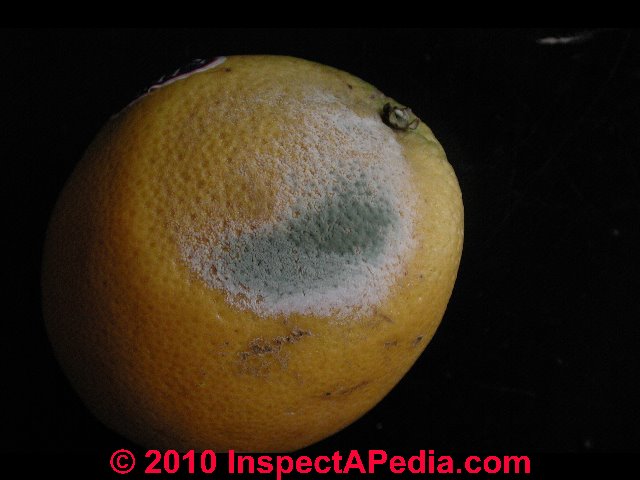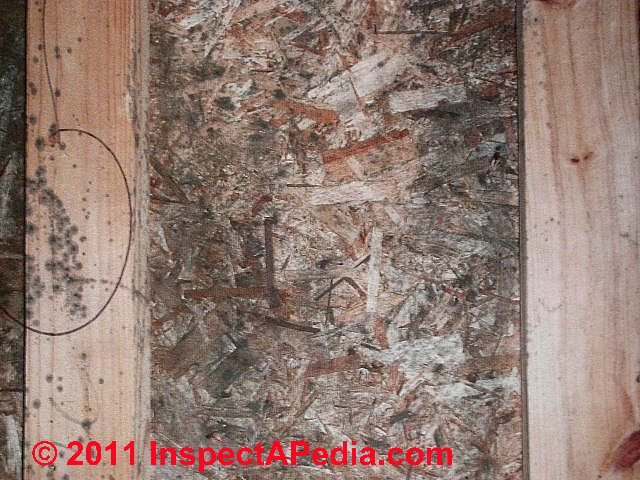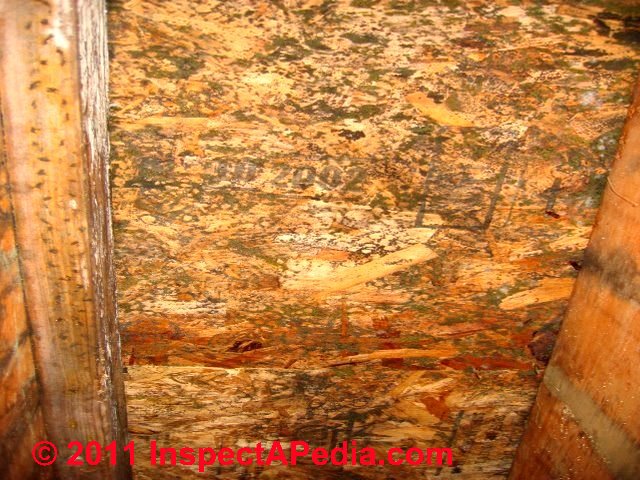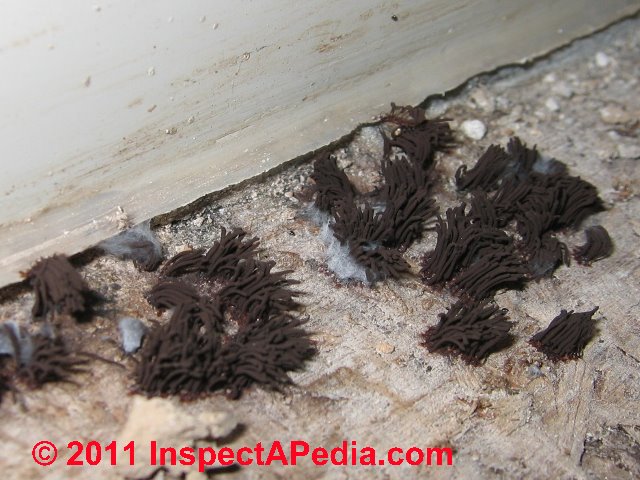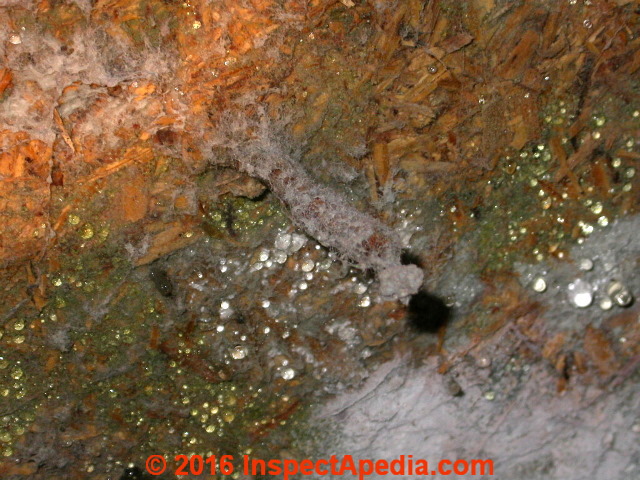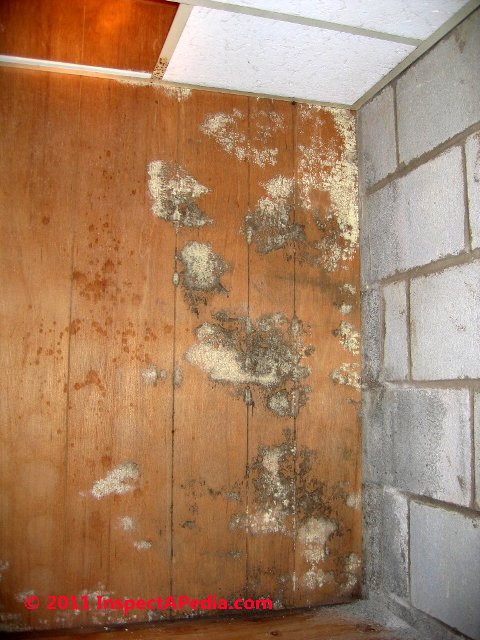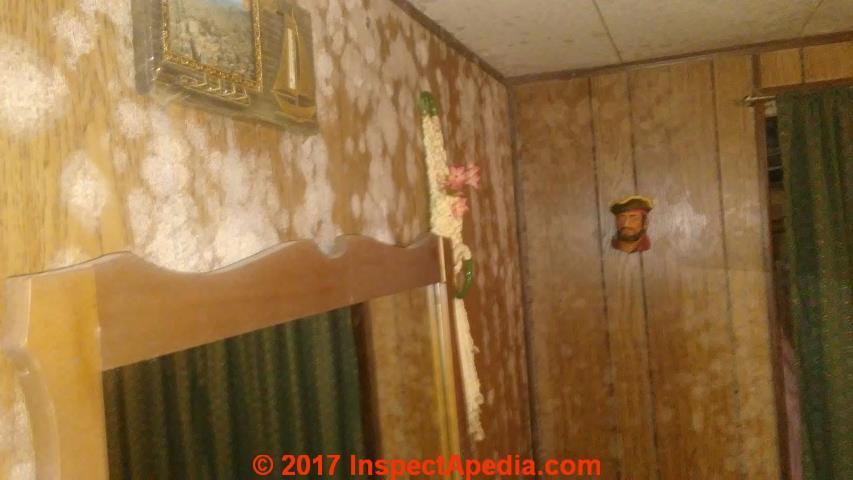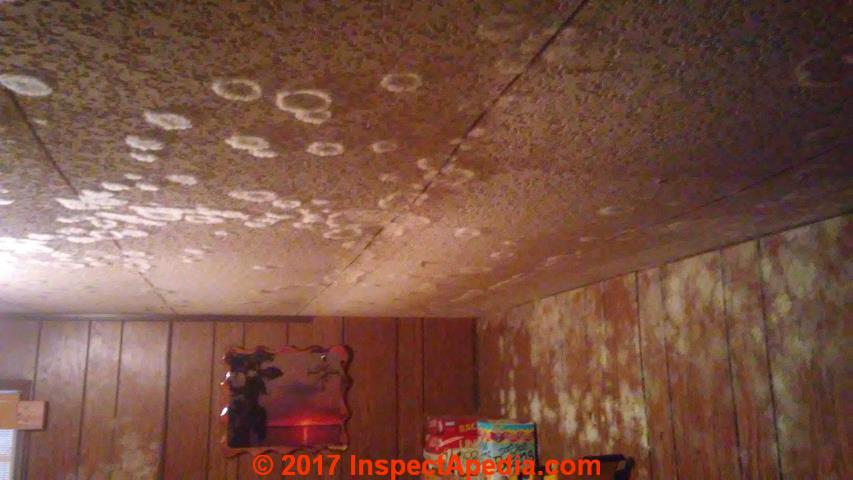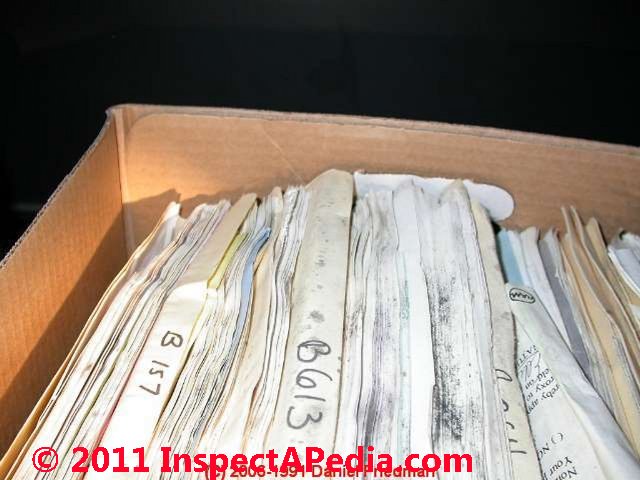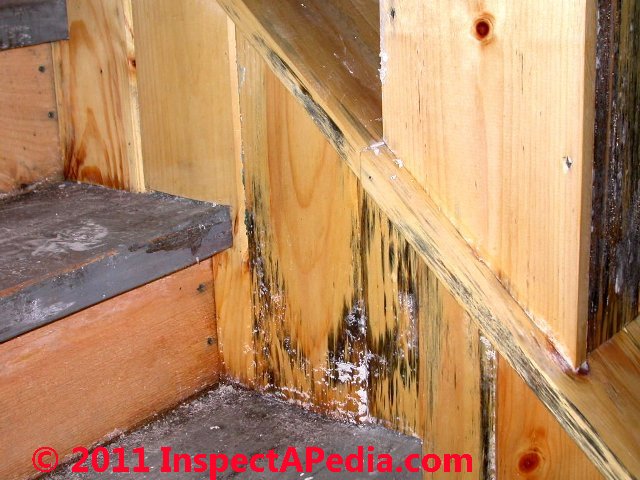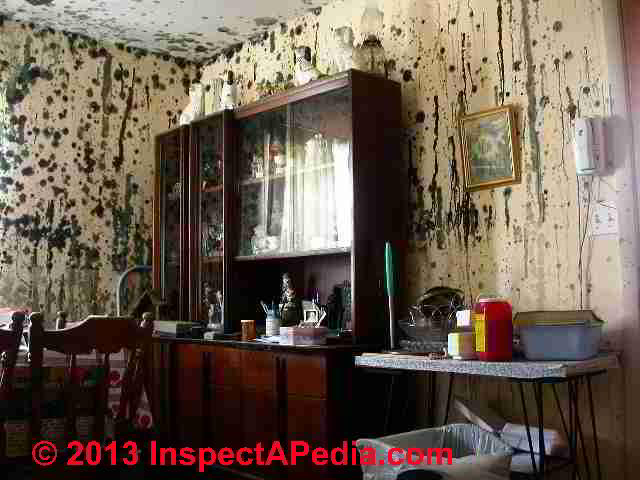 Mold In-Situ: Photos of Mold on Surfaces - Group 7
Mold In-Situ: Photos of Mold on Surfaces - Group 7
Appearance of Mold on Different Materials & Surfaces.
- POST a QUESTION or COMMENT about what mold looks like in buildings, including mobile homes and trailers
Photographs of mold growth in buildings:
Here is a photo guide to mold on fruit around the house such as oranges, mold on OSB board, mold on painted drywall, mold growth on painted masonry surfaces, mold on painted wood, mold growth on wood paneling, mold contamination and growth on paper such as file folders, mold on pine wall or ceiling paneling, moldy wood trim boards, mold on pipes (possibly), mold on houseplants, mildew on houseplants.
What does mold look like growing on various building & other material surfaces? Here is an online reference photo library of various kinds of mold as it is found growing on a wide range of surfaces and materials found on or in buildings. These photos of mold on indoor various materials or "mold growth substrates" may help you recognize mold in buildings, recognize probably-cosmetic mold, and recognize stuff that is not mold and does not need to be tested.
InspectAPedia tolerates no conflicts of interest. We have no relationship with advertisers, products, or services discussed at this website.
- Daniel Friedman, Publisher/Editor/Author - See WHO ARE WE?
Pictures of Mold on Various Building Surfaces and Materials
Use the link
MOLD APPEARANCE on VARIOUS SURFACES - INDEX
to return to the index / list of photographs of the appearance of mold on various building materials & contents.
--- MOLD GROWTH on MATERIAL SURFACES PHOTOS GROUP 7 ---
- MOLD on ORANGES
- MOLD on OSB SHEATHING BOARD
- MOLD on PAINTED DRYWALL
- MOLD on PAINTED MASONRY
- MOLD on PAINTED WOOD
- MOLD on PANELING, WOOD
- MOLD on PAPERS, FILES
- MOLD on PHOTOGRAPHS, CLEAN-UP
- MOLD on PINE PANELING, TRIM, BOARDS
- MOLD on PIPES
- MOLD on PLANTS = MILDEW
Photographs of mould found on the surface of items, materials, & surfaces found indoors
[Click to enlarge any image]
Mold on Oranges
More photos of moldy food and information about Mycotoxicosis are at MOLD EXPOSURE, FOOD HAZARDS.
Mold on OSB Sheathing Board used as subflooring, roof sheathing, wall sheathing
The brown mold on OSB subflooring (above) is most likely a very different genera/species than the green OSB mold below.
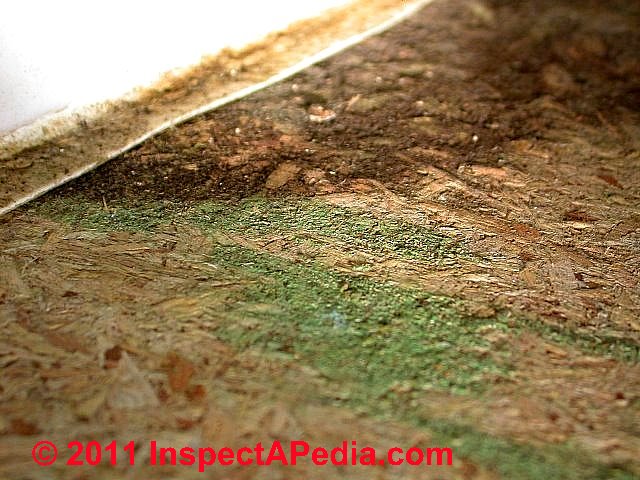
Just below left is brown mold on OSB sheathing used in a roof structure.
Next, below our moldy OSB subfloor photo illustrates one of our favorite molds, Stemonitis sp. - often found growing in a fairy ring pattern on OSB subfloor that has been soaked.
We observed this mold growth in partly-repaired condominium that had suffered burst pipe flooding in upstate New York.
Additional simlar photos of mold on these materials are at MOLD on SUBFLOORING
Below: severe green & gray mold contamination on wet OSB Oriented Strand Board (green mold, white mold, gray mold, most-likely multiple mold genera/species) in a crawl space that was not adequately vented and that also suffered leaks and frost.
Below: extensive dark brown mold contamiantion on OSB and on wood framing.
Mold on Painted Drywall
The severely-contaminated home shown above had been left unattended in winter in upstate New York. A baseboard heating system leak created high indoor moisture as well as warmth.
The drywall surfaces of walls and ceilings had been painted with several coats of paint but those coatings could not prevent this mold growth given the building conditions.
Many of the mold-in-situ photographs shown in this article were collected in this home where we (at our expense not that of the insurance company) sampled and tested more than 100 indoor surfaces to determine the preferences of different mold genera/species for different building contents and building materials.
See DRYWALL MOLD TESTING for a guide to testing and repairing moldy drywall or plasterboard.
See additional photos at MOLD on DRYWALL & SHEETROCK®
Mold on Painted Masonry
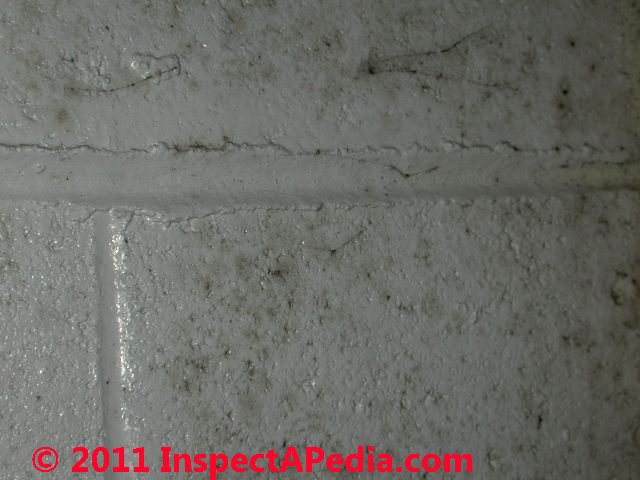
This photograph illustrates mold growth on a painted masonry block wall. We believe that the mold is growing on and feeding on the paint itself.
Mold on Painted Wood
These photographs illustrate mold growth on painted wood framing and subfloor over a wet basement. The colors suggest that more than one mold genera/species is present.

Mold on Paneling, Wood
Our photograph of mold on wall paneling (below left) illustrate how mold growth may appear on these materials.
Above our photo shows the dominance of mold at a building corner combined with the water stains on the block wall at the right side of the photo argue for a water problem that may be traced to a downspout spilling at the building corner outside.
The second mold photo (below) shows black mold on light colored wall paneling. Actually a closer look showed at least three different colors of mold [click to enlarge any of our images] and thus probably multiple species of mold present on this surface.
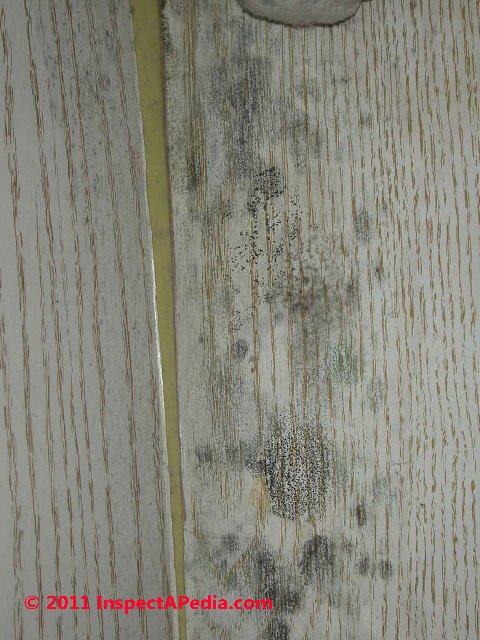
The pictures just below illustrate more subtle mold growth on wall paneling as well as how careful use of light can show up much more mold on a surface than may at first be apparent.
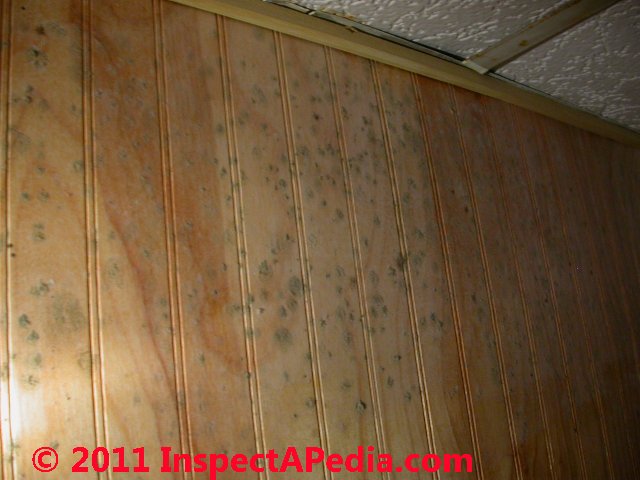
Mold growth variation on different components of wood paneling
As our photos below illustrate, moldy wood paneling in buildings can be tricky to spot because the mold may be hidden on the wall-side of the paneling and be not present or at least not visible on the room side (photo at below left). This problem is discussed at HIDDEN MOLD in PANELING.
We also find different mold growth in quantity and sometimes genera/species in the grooves on wood paneling than on the surface of wood paneling (photo, below right). The explanation may be that the groove cut in laminated wood paneling exposes a different texture and wood species as well as exposing a different coating (black paint or stain).
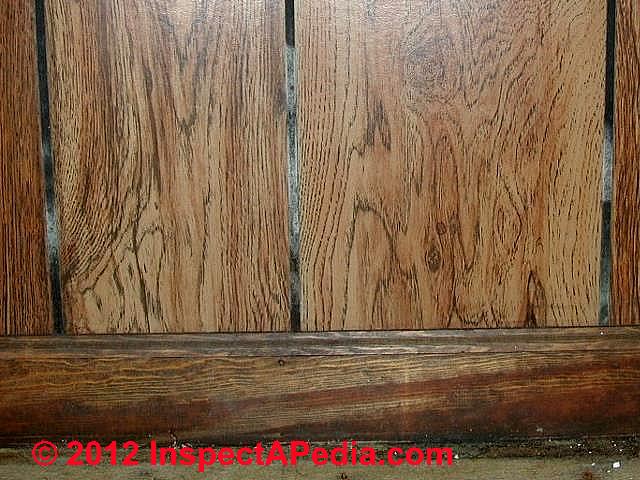
The different texture of a milled groove in some wood panels grabs more moisture or more airborne spores than the harder smoother finished segments. This is another example of the trip-ups in indoor mold tests.
Even eschewing an air "test", a surface sample will be entirely different depending on whether or not you stick the collecting tape on those black-painted wood grooves.
Extreme Mold Contamination on Wood Paneling
Below: white mold on wall paneling and on the ceiling of a mobile home, photos contributed by reader M.M.
and
Watch out: Never assume that the mold you see on a wall or ceiling surface is the extent of the mold concern. Particularly where the surface mold growth has appeared beacause of leaks into the wall or ceiling cavity an additional, perhaps larger mold contamination reservoir may be hidden from view.
Be sure to also see HIDDEN MOLD in PANELING
The mobile home ceiling mold shown above is discussed further in a Q&A on distinguishing mold from stuff that is not mold, found
at MOLD APPEARANCE, STUFF THAT'S NOT MOLD - FAQs
Mold on Papers, Files
Several mold species grow readily and quickly on papers exposed to water or even high humidity, as we illustrate with our photos of file cabinet flooding below left and right.
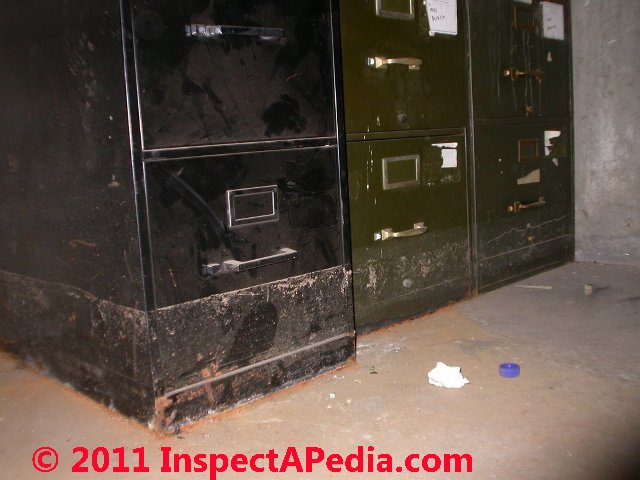
When papers and paper file folders remain in a wet area heavy mold growth, including Aspergillus sp. are likely to be found. At below right we appreciated the irony of finding this moldy magazine in a flooded home - Fungi Perfecti.
See BOOK / DOCUMENT MOLD & WATER DAMAGE RESTORATION for details about dealing with and restoring moldy books and papers.
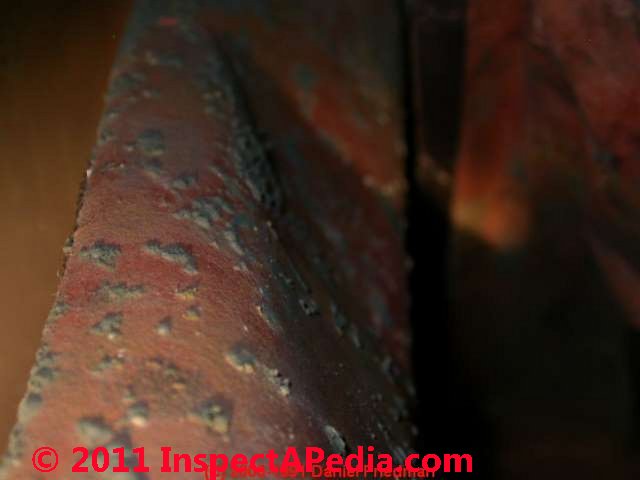
See FOXING STAINS on books & papers for details about these stains and marks on books and papers.
Mold on Pine Paneling or Pine Trim Boards
Our photographs below illustrate how mold growth appears on solid pine wood paneling. At below left the rough-sawn pine boards were installed over drywall in a home where basement flooding had gone unattended.
At below right the bevel-edged traditional pine paneling installed on stairwell walls and in the home's basement was severely mold damaged.
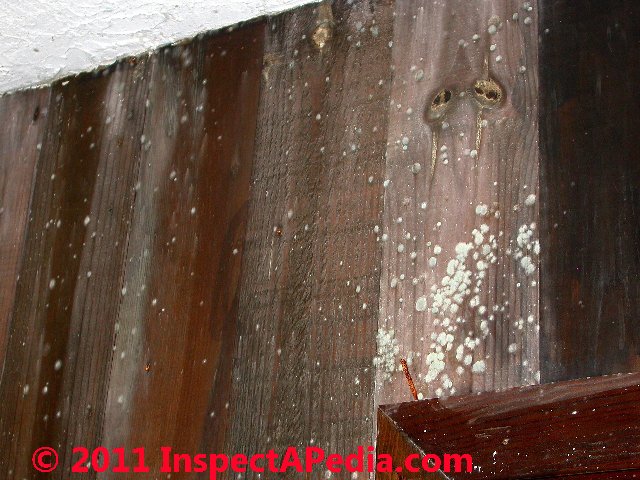
Watch out: we sometimes find extensive mold growth on the wall-cavity side of pine paneling in damp or wet homes even if the room side looks clean.
The un-coated surfaces of wood products take up moisture and thus can support mold growth more quickly than a coated and moisture-resistant surface.
Mold on Metal Pipes?
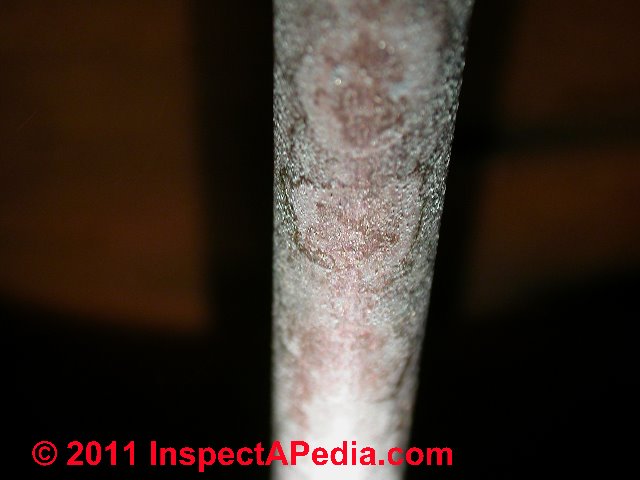
This photograph illustrates how difficult it might be to distinguish between corrosion (expected to be found on copper piping exposed to moisture or corrosive conditions), and fungal growth.
If a lab test found growing mold on this surface we suspect it would be due to the presence of organic dust and debris.
Mold on Plants, Mildew
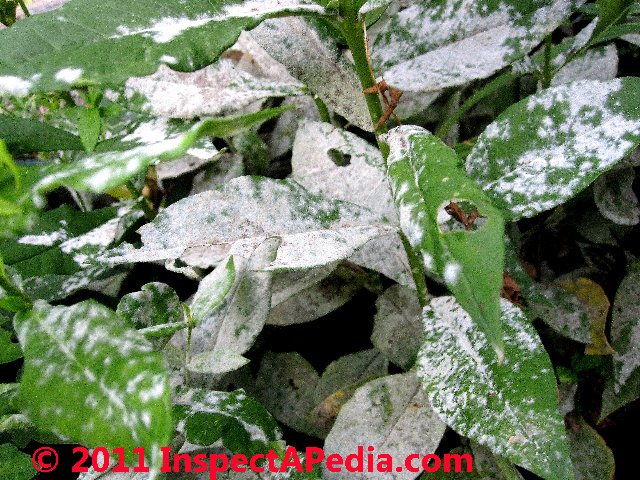
This photograph illustrates mildew growth on plants. There are two mildew groups, both Ustilaginales, a family that also contains plant rusts and smuts. The two mildew groups are Oidium-Erysiphe or Powdery Mildew and Peronosporaceae or Downy Mildew.
Mildew is an obligate parasite that grows only on living plants.
So when you read a product label or an article about indoor mold that uses the term "mildew", if the writer is referring to mold on other materials and surfaces than living plants, s/he is probably mistaken.
See
CONTACT us to submit photographs of mold growth on other man-made or building-related materials.
...
Continue reading at MOLD GROWTH on SURFACES, PHOTOS_GROUP_8 or select a topic from the closely-related articles below, or see the complete ARTICLE INDEX.
Or see these
Mold Identification Articles
- BLACK MOLD, HARMLESS
- MOLD APPEARANCE on VARIOUS SURFACES index to photos of mold on all kinds of surfaces and materials
- MOLD APPEARANCE - WHAT MOLD LOOKS LIKE - home
- MOLD APPEARANCE - STUFF THAT IS NOT MOLD
- MOLD ATLAS & PARTICLES INDEX
- MOLD FREQUENCY in BUILDINGS
- MOLD in BUILDINGS
- MOLD CONTAMINATION IN BUILDINGS - home
- MOLD by MICROSCOPE - mold under the microscope
- MOLD in the PETRI DISH, PHOTOS - mold on culture plates or in culture-type mold test kits
- MOLD RELATED ILLNESS SYMPTOMS
Suggested citation for this web page
MOLD GROWTH on SURFACES, PHOTOS_GROUP_7 at InspectApedia.com - online encyclopedia of building & environmental inspection, testing, diagnosis, repair, & problem prevention advice.
Or see this
INDEX to RELATED ARTICLES: ARTICLE INDEX to MOLD CONTAMINATION & REMEDIATION
Or use the SEARCH BOX found below to Ask a Question or Search InspectApedia
Ask a Question or Search InspectApedia
Try the search box just below, or if you prefer, post a question or comment in the Comments box below and we will respond promptly.
Search the InspectApedia website
Note: appearance of your Comment below may be delayed: if your comment contains an image, photograph, web link, or text that looks to the software as if it might be a web link, your posting will appear after it has been approved by a moderator. Apologies for the delay.
Only one image can be added per comment but you can post as many comments, and therefore images, as you like.
You will not receive a notification when a response to your question has been posted.
Please bookmark this page to make it easy for you to check back for our response.
IF above you see "Comment Form is loading comments..." then COMMENT BOX - countable.ca / bawkbox.com IS NOT WORKING.
In any case you are welcome to send an email directly to us at InspectApedia.com at editor@inspectApedia.com
We'll reply to you directly. Please help us help you by noting, in your email, the URL of the InspectApedia page where you wanted to comment.
Citations & References
In addition to any citations in the article above, a full list is available on request.
- [2] Dictionary of the Fungi, 9th Ed., PM Kirk, PF Cannon, JC David, && JA Stalpers Ed., CABI Publishing 2001 ISBN 0 85199 377 X www.cabi.org UK
- [3] Fifth Kingdom, The, 2nd ed., Bryce Kendrick, Mycologue Publications 1992, ISBN 0-941051-28-5
- [4] Fungi From Utility Poles in the Eastern United States, Identification Manual for, CJK Wang & RA Zabel Ed., Allen Press, 1990, ISBN 0-93-0009-31-2
- [5] Fungi, Identifying Filamentous, A Clinical Laboratory Handbook, Guy St-Germain, Richard Summerbell, Star Publishing, 1996, ISBN 0-89863-177-7 (English)
- [6] Pictorial Atlas of Soil and Seed Fungi, , 2nd Ed., Tsuneo Watanabe, 2002 CRC Press, ISBN 0-8493-1118-7
- [7] Fungus, The Whole, Vol. 1, Bryce Kendrick, Ed., National Museum of Natural Sciences (et als), 1979, ISBN 0-660-00146-2 (available from B. Kendrick, Waterloo, Canada)
- Fungus, The Whole, Vol. 2, Bryce Kendrick,Ed., National Museum of Natural Sciences (et als), 1979, ISBN 0-660-00146-2 (available from B. Kendrick, Waterloo, Canada)
- [8] Fusarium, Paul E. Nelson Memorial Symposium, Summerall et als. Ed., APS Press 2001, ISBN 0-89054-268-6
- [9] Hyphomycetes their perfect and imperfect connexions, K. Tubaki, J Cramer 1981, ISBN 3-7682-1267-X
- [10] Dematiaceous Hyphomycetes, , M.B. Ellis, CAB International 1971, ISBN 0-85198-027-8, Commonwealth Mycological Institute, Kew, Surrey, England, ABE-Print.com
- [11] More Dematiaceous Hyphomycetes, M.B. Ellis, CAB International 1976, ISBN 0-85198-3650-, Commonwealth Mycological Institute, Kew, w:st="on">Surrey, England
- [12] Illustrated Genera of Imperfect Fungi, 4th Ed., HL Barnett & Barry B. Hunter, American Phytopathological Society Press, St. Paul, 1998, ISBN 0-89054-192-2
- [13] Microfungi on Miscellaneous Substrates, Martin B. Ellis & J.Pamela Ellis, Crook Helm, London & Sydney 1988, ISBN 0-88192-115-7
- [14]Runeberg, Ulrik, STAINING AND MICROBIOLOGICAL INFESTATION OF ACRYLIC PAINTINGS ON HARDBOARD [PDF] (2008),Conservator (Dipl. Rest./M.A.), Restaurierungszentrum der Landeshauptstadt Düsseldorf, Germany, Email: Rune-Ulrik@gmx.de Previously Museo de Arte Contemporáneo de Puerto Rico, San Juan Presented, April 2007 conference in Richmond Virginia, sponsored by the AIC (American Institute for Conservation), this paper discusses the staining and microbial infestation of acrylic paintings on hardboard. - private correspondence, ER <->DF 2020/01/05 - 2006/09/12. (Also see PAINT FALURE, DIAGNOSIS, CURE, PREVENTION)
- In addition to citations & references found in this article, see the research citations given at the end of the related articles found at our suggested
CONTINUE READING or RECOMMENDED ARTICLES.
- Carson, Dunlop & Associates Ltd., 120 Carlton Street Suite 407, Toronto ON M5A 4K2. Tel: (416) 964-9415 1-800-268-7070 Email: info@carsondunlop.com. Alan Carson is a past president of ASHI, the American Society of Home Inspectors.
Thanks to Alan Carson and Bob Dunlop, for permission for InspectAPedia to use text excerpts from The HOME REFERENCE BOOK - the Encyclopedia of Homes and to use illustrations from The ILLUSTRATED HOME .
Carson Dunlop Associates provides extensive home inspection education and report writing material. In gratitude we provide links to tsome Carson Dunlop Associates products and services.


